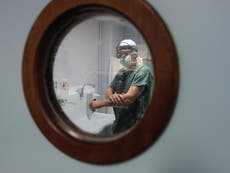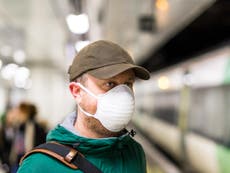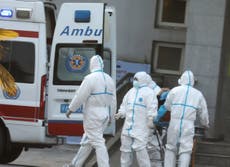For Catholics like me, coronavirus has transformed worship
The church has moved, albeit slowly, with the technological times. Coronavirus will force Catholicism to modernise even further
On 14 March, prime minister Édouard Philippe announced that France was moving into the third stage of its response to coronavirus. Cafés, bars, restaurants, theatres and cinemas are to close down, as are schools and colleges. Food shops, tobacconists, pharmacies and public transport would remain open, Philippe said – though French transport minister Elisabeth Borne announced that train and metro services would be reduced to a minimum as of this week. People are advised to work from home, avoid seeing family and refrain from any non-essential travel.
French citizens are in shock. Though well aware of the scale of the crisis, they hadn’t anticipated such draconian measures.
Perhaps one of the biggest adjustments in France will be made by the nation’s Catholics, who comprise around 54 per cent of the population: Sunday mass is cancelled. This is on the advice not only of the government, but of several archbishops, who have written to their dioceses saying that public gatherings of over a hundred people are inadvisable, and that baptisms and weddings should be delayed. The archbishop of Paris, Monseigneur Michel Aupetit, himself a former medical doctor, said it was right to err on the side of caution.
While at first, parishes began planning extra services in order to have less than 100 people at each one, this quickly became untenable.
Instead, priests found a different solution.
Since 1949, Sunday mass has been broadcast on French television, and continues to be very popular. More recently, French churches have begun uploading their masses to YouTube and Facebook. Both came into good use on Sunday 15 March, when churches across France were forced to close.
I lived in Paris for eleven years. It was there that I chose to convert to Catholicism. Although born to a twelve-generation Jewish rabbinic tradition on my father’s side, and Muslim theological scholarship on my mother’s, I chose a different way.
During my adolescence in France, both antisemitism and islamophobia were on the rise, apparent even in my school’s playground. This growing hate made me vulnerable and frightened. The fourteenth-century church, anchored to the house where I had summered every year since I was by born, seemed peaceful by contrast.
It smelt deliciously of frankincense; lifted my spirits with its organ music and hymns; transfixing my gaze with its jewel-coloured stained glass windows and its approachable statues of the Virgin Mary. It’s interior transported me to a world very far from the distressing one of the evening news.
I had served as an altar boy – along with Muslim boys of Algerian extraction, who were the only available children in a village with an ageing population – in this church in France’s Var region. I was baptised there in 2011.
This same parish was among those that decided to broadcast its mass via Facebook. I watched it with feeling, but was downcast, as the internet connection in the desolate chapel was poor. There were no hymns; the priest had to do all the readings himself, then give the sermon unaided. Though a pragmatic solution, no doubt, he was unaccustomed to social media, so there were some awkward silences. It was certainly unlike the physical celebrations of mass that I knew.
I also watched the Basilica of Alencon’s mass on the church's YouTube channel. It was disquieting to see a church so empty during Lent. Then again, it was encouraging to see how many people I was joined by online.
The church has moved, albeit slowly, with the technological times, even jumping on the bandwagon of social media; even the Pope is on Twitter. Coronavirus will force Catholicism to modernise even further – and perhaps in so doing, make the church accessible to more and more people.
Around the time of last year's Holy Week, the Catholic Church in France suffered a stunning blow, as Notre Dame Cathedral caught fire. Within days, however, a stopgap was found, alternative services for Holy Week and Easter were organised at the Church of Saint Sulpice. This year too, when confronted with coronavirus, worshippers are finding workarounds. Throughout history, crises have come and gone, but prayer persists.







Join our commenting forum
Join thought-provoking conversations, follow other Independent readers and see their replies